Presenter's pdfs of their presentation, and videos are available below.
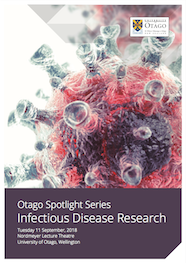
Download our Infectious Disease Research programme (PDF 2.1MB)
Need a day mixing with an interesting array of colleagues while holding fascination conversations over delicious food, and being exposed to thought-provoking research?
Catch the bug and join us!
Tuesday 11 September, 9am-3.30pm, Nordmeyer Theatre, 23A Mein St, Newtown, WellingtonVenue map
Join us to hear University of Otago researchers providing short, easy-to-understand outlines of their work:
- Disease prevention and control
- Understanding bacteria, viruses and parasites
- Animal, plant and environmental links to human health
No cost to attend and plenty to learn.
It's not too late - register now:Email wendy.houliston@otago.ac.nz
Visit our website for more about Otago's research in infectious disease:
Infectious Disease Research at Otago
Student poster competition
Meet the winners of the competition: Early immune response research wins Otago Spotlight Award
A poster competition will be held for students involved in infectious disease research in Wellington the evening before the forum (Monday 10 September). Students are asked to clearly communicate their research methodology and findings to others who may not be a specialist in their field. Finalists will present their work to the forum audience on Tuesday for final judging.
Entries for the poster competition have now closed.
Infectious disease forum programme and presenters
9.00am Mihi
9.15am Professor Michael Baker
Topic: Rheumatic Fever - How can we end this terrible disease of poverty?
 Professor Michael Baker is a public health physician and Professor in the Department of Public Health, University of Otago, Wellington. He is the Director of the Health Environment & Infection Research Unit (HEIRU) and a Co-Director of He Kainga Oranga/Housing and Health Research Programme.
Professor Michael Baker is a public health physician and Professor in the Department of Public Health, University of Otago, Wellington. He is the Director of the Health Environment & Infection Research Unit (HEIRU) and a Co-Director of He Kainga Oranga/Housing and Health Research Programme.
Michael has broad research interests across infectious diseases, environmental health and housing. A key focus of his collaborative work is on rheumatic fever where he is leading three Health Research Council funded projects. These studies aim to identify modifiable risk factors for this disease, understand the role of skin infections, and find an optimal set of interventions to end rheumatic fever as a major health problem in New Zealand.
- Health Environment and Infection Research Unit (HEIRU)
- He Kainga Oranga / Housing and Health Research Programme
- Follow Public Health UOW on twitter
- Michael Baker: Rheumatic fever: How can we end this terrible disease of poverty? (PDF 3 MB)
- Michael Baker: Rheumatic fever: How can we end this terrible disease of poverty? (28 minutes, YouTube)
9.45am Associate Professor Bruce Russell
Topic: Parasite threats to New Zealand: Far, near and future
 Associate Professor Bruce Russell investigates Vivax Malaria (or Relapsing Malaria), the most widely distributed, difficult to diagnose and treat cause of human malaria.
Associate Professor Bruce Russell investigates Vivax Malaria (or Relapsing Malaria), the most widely distributed, difficult to diagnose and treat cause of human malaria.
Dr Russell's laboratory focuses in of the biology of the parasite Plasmodium vivax (the cause of vivax malaria) and how we can kill it using therapeutics or vaccinations. To do this his team has developed key ex vivo tools and methods to examine P. vivax drug susceptibility and reticulocyte invasion. In addition to vivax malaria the lab also undertakes research into the biology and epidemiology of protozoal parasites of importance to human health in New Zealand.
- Russell Lab
- Bruce Russell: Parasite threats to New Zealand: Far, near and future (PDF 3.4 MB)
- Bruce Russell: Parasite threats to New Zealand: Far, near and future (25 minutes, YouTube)
10.05 Associate Professor Catherine Stedman
Topic: Hepatitis C: Time for elimination?
 Dr Stedman is Clinical Associate Professor in the Department of Medicine, University of Otago, Christchurch.
Dr Stedman is Clinical Associate Professor in the Department of Medicine, University of Otago, Christchurch.
Dr Stedman's field of research is liver disease and pharmacology, focusing on hepatitis C and autoimmune liver diseases. Her published papers in hepatitis C epidemiology
have influenced global understanding of chronic hepatitis C epidemiology including government and Ministry of Health understanding and approach to hepatitis C treatment strategies.
- Department of Medicine
- Catherine Stedman: Hepatitis C: Time for elimination? (PDF 1.8 MB)
- Catherine Stedman: Hepatitis C: Time for elimination? (19 Minutes, YouTube)
10.25am Morning tea and coffee
11.00am Dr James Ussher
Topic: New technologies for diagnostics
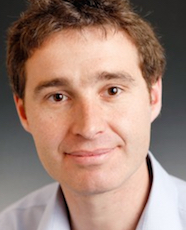 Dr James Ussher's research interest is infection and immunity. In particular, he is interested in mucosal associated invariant T (MAIT) cells, their role in antibacterial immunity, and how they might be harnessed to prevent or treat bacterial infection.
Dr James Ussher's research interest is infection and immunity. In particular, he is interested in mucosal associated invariant T (MAIT) cells, their role in antibacterial immunity, and how they might be harnessed to prevent or treat bacterial infection.
He has been involved in several fundamental discoveries in MAIT cell biology. He is also interested in the antimicrobial resistance, in particular its rapid detection, characterisation, and transmission, especially in Enterobacteriaceae. His clinical specialty is medical microbiology.
- Ussher Lab
- James Ussher: New sequencing technologies for infectious diseases (PDF 3.6 MB)
- James Ussher: New sequencing technologies for infectious diseases (22 minutes, YouTube)
11.20am Professor Kurt Krause
Topic: New anti-microbial development based on targeting the enzyme, glutamate racemase
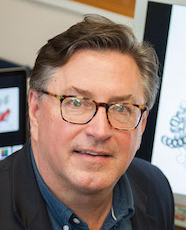 Professor Kurt Krause is a Professor of Biochemistry at the University of Otago.
Professor Kurt Krause is a Professor of Biochemistry at the University of Otago.
He has a longstanding interest in structure and function in biology and his research areas include the structure and function of enzymes and proteins important in infectious diseases, such as bacterial pathogenesis factors, antibiotic targets, viral immunomodulatory proteins, and bioluminescence related proteins.
- Webster Centre for Infectious Diseases
- Kurt Krause: Spotlight 2018 Infectious Diseases (PDF 2.1 MB)
- Kurt Krause: Spotlight 2018 Infectious Diseases (20 minutes, YouTube)
11.40am Dr Jo Kirman
Topic: Deciphering the protective immune response to Tuberculosis
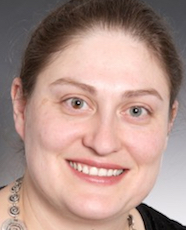 Dr Jo Kirman's areas of research include Animal Disease, Applied and Molecular Immunology, Medical Microbiology and Microbial Pathogenesis, Vaccines Immunology and Technology.
Dr Jo Kirman's areas of research include Animal Disease, Applied and Molecular Immunology, Medical Microbiology and Microbial Pathogenesis, Vaccines Immunology and Technology.
Her primary research focus is the generation and maintenance of the protective T-cell immune response to Tuberculosis (TB). Tuberculosis kills over one million people worldwide each year. Additionally, she is interested in how to prevent paediatric infectious diseases including human respiratory syncytial virus and rotavirus.
- Kirman Lab
- Jo Kirman: Deciphering the protective immune response (PDF 1.1 MB)
- Jo Kirman: Deciphering the protective immune response (18.5 minutes, YouTube)
12.00pm Finalists of the student poster competition present their work
12.20pm Lunch
1.20pm Professor Gregory M Cook, FRSNZ
Topic: Opportunities for Infectious Disease Research in New Zealand: a Biomedical Perspective.
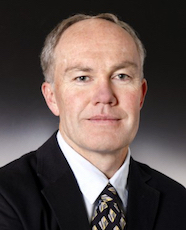 Professor Greg Cook's research is focused on developing bacterial metabolism and energetics as a new target space for drug development to combat bacterial pathogens in humans (Mycobacterium tuberculosis) and treat and prevent disease in food animals and plants. The goal of this work is to produce new and fast-acting drugs that will address the issues of antimicrobial resistance and persistence.
Professor Greg Cook's research is focused on developing bacterial metabolism and energetics as a new target space for drug development to combat bacterial pathogens in humans (Mycobacterium tuberculosis) and treat and prevent disease in food animals and plants. The goal of this work is to produce new and fast-acting drugs that will address the issues of antimicrobial resistance and persistence.
Cook leads a multidisciplinary science team:
- Cook Lab
- Greg Cook: Opportunities for Infectious Disease Research in New Zealand: a Biomedical Perspective (PDF 2.1 MB)
- Greg Cook: Opportunities for Infectious Disease Research in New Zealand: a Biomedical Perspective (32 minutes, YouTube)
1.50pm Associate Professor Brian Monk
Topic: The hidden danger of fungal infections
 Associate Professor Brian Monk considers it imperative that new ways are discovered to combat infectious disease, especially where clinically significant drug resistance has emerged.
Associate Professor Brian Monk considers it imperative that new ways are discovered to combat infectious disease, especially where clinically significant drug resistance has emerged.
Dr Monk uses molecular genetic manipulation of yeast and bacterial systems to express drug targets for effective screening of compound libraries. Most of the antifungal targets he has developed are membrane proteins. Other targets include fungal transcription factors and enzymes involved in fungal riboflavin biosynthesis.
The yeast expression system patented by Dr Monk in 2003 is used widely to express membrane proteins from a range of sources including pathogenic fungi, plants, and humans.
- Sir John Walsh Research Institute
- Brian Monk: The hidden danger of fungal infections (PDF 3.3 MB)
- Brian Monk: The hidden danger of fungal infections (26 minutes, YouTube)
2.10pm Dr Amanda Kvalsvig
Topic: Pre-hospital management of meningococcal disease: New evidence to optimise survival
 Amanda Kvalsvig has a dual background in clinical paediatrics and epidemiology. She is a Senior Research Fellow in the Department of Public Health at UOW. Her research interests are centred on the social determinants of children's health and wellbeing: current topics include infectious diseases, breastfeeding, child poverty and early child development. She also has a methodological interest in the challenges of analysing existing data to develop high-quality evidence for policy and practice.
Amanda Kvalsvig has a dual background in clinical paediatrics and epidemiology. She is a Senior Research Fellow in the Department of Public Health at UOW. Her research interests are centred on the social determinants of children's health and wellbeing: current topics include infectious diseases, breastfeeding, child poverty and early child development. She also has a methodological interest in the challenges of analysing existing data to develop high-quality evidence for policy and practice.
Dr Kvalsvig recently obtained a PhD degree for her epidemiological investigation of meningococcal disease management; the thesis was awarded Exceptional status.
- Department of Public Health
- Amanda Kvalsvig: Pre-hospital treatment of meningococcal disease (PDF 1.5)
- Amanda Kvalsvig: Pre-hospital treatment of meningococcal disease (15 minutes, YouTube)
2.30pm Dr Natalie Martin
Topic: Childhood bacterial and aseptic meningitis: findings from the UK-ChiMES study and beyond
 Dr Natalie Martin is a general paediatrician working with Professor Andrew Day on paediatric inflammatory bowel disease (IBD) research including early life predictors and outcomes in IBD. She completed a DPhil in Paediatrics at Oxford University in 2018. She worked as a clinical research fellow in the Department of Paediatrics, University of Oxford, UK from 2012 to 2015. She trained in paediatrics at Christchurch, Palmerston North, Starship and Middlemore hospitals. Her research interests include bacterial and viral meningitis in children. She is extensively involved in a current UK multicentre cohort study of childhood central nervous system infection, in addition to epidemiological studies.
Dr Natalie Martin is a general paediatrician working with Professor Andrew Day on paediatric inflammatory bowel disease (IBD) research including early life predictors and outcomes in IBD. She completed a DPhil in Paediatrics at Oxford University in 2018. She worked as a clinical research fellow in the Department of Paediatrics, University of Oxford, UK from 2012 to 2015. She trained in paediatrics at Christchurch, Palmerston North, Starship and Middlemore hospitals. Her research interests include bacterial and viral meningitis in children. She is extensively involved in a current UK multicentre cohort study of childhood central nervous system infection, in addition to epidemiological studies.
2.50pm Associate Professor Patricia Priest
Topic: The 'One Health' concept
 Associate Professor Patricia Priest is Head of the Department of Preventive and Social Medicine at the Dunedin School of Medicine. She has research interests in infectious disease epidemiology and prevention / control, screening, and public health / epidemiology.
Associate Professor Patricia Priest is Head of the Department of Preventive and Social Medicine at the Dunedin School of Medicine. She has research interests in infectious disease epidemiology and prevention / control, screening, and public health / epidemiology.
- Department of Preventive and Social Medicine
- Patricia Priest: The One Health concept: An integrated approach to understanding, preventing and controlling infectious diseases (PDF 1.6 MB)
- Patricia Priest: The One Health concept: An integrated approach to understanding, preventing and controlling infectious diseases (15.5 minutes, YouTube)
3.10pm Wrap-up discussion
3.30pm Afternoon tea and coffee
Infectious Disease website

Infectious Disease Research at Otago
Previous forums
2017 Otago Spotlight Series: Child Health Research

2016 Otago Spotlight Series: Cardiovascular Disease

2015 Otago Spotlight Series: Cancer Research

2014 Research Forum
